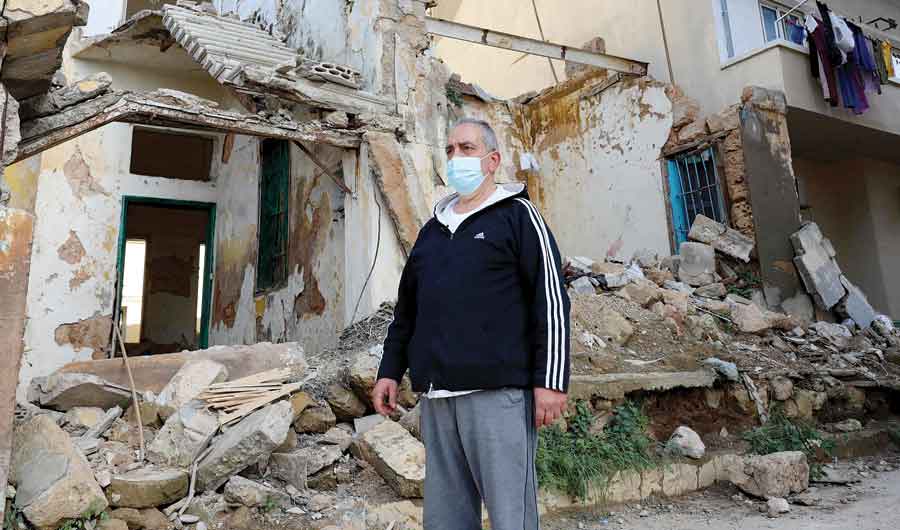BEIRUT: As Lebanon marks the 46th anniversary of its bloody civil war on April 13, public figures are warning that the country’s worsening crisis could lead to new conflict.
Though the regional and international situation is now different, Lebanon still faces the same fault lines that lead to the eruption of war in 1975.
The country’s unprecedented economic and social crisis, coupled with political gridlock, presents a situation that some are warning is reminiscent of pre-war Lebanon.
In 1990, fighting stopped after the signing of the Taif Agreement, which established a political settlement that has remained until today.
The brutal 15-year war killed more than 150,000 people and left 300,000 others with long-term injuries. On top of that, 17,000 people were missing by the end of the conflict, while more than 1 million Lebanese — one-third of the population — were displaced.
In March 1991, a general amnesty law was issued for all war crimes, with the exception of kidnappings, which were considered persistent crimes.
Militias were disbanded, except for Hezbollah, which kept its weapons under the rubric of resisting the Israeli enemy. Today, Hezbollah holds the largest arsenal of weapons in the country, an amount 10 times larger than that of Lebanon’s army.

Civil war survivor Jean Saliba is pictured in front of buildings damaged by the Aug. 4 Beirut port blast in the Karantina district of the Lebanese capital. (AFP)
Nizar Saghieh, a laywer and representative of the Committee of the Families of Kidnapped and Disappeared, told Arab News: “The war was based on the logic that the strong party rules by force of arms.
“We are still being ruled this way. No one is being held accountable and there is no recognition of the law.”
He added: “It is true that military and war actions stopped with the end of the civil war, but in practice, the post-war system is one that restored all war values to control the country and reduced public policy to war leaders, and now we live in the midst of a system in which no one is held accountable.
“We are living in disaster after the Aug. 4 explosion and we are experiencing an economic collapse.
“This means that we are in the stage of systematic destruction of the state. The strong do not feel that there should be a law that embraces equality.”
The fate of those who disappeared during the war remains relevant today, Saghieh said. “Those in power try to push people to forget the past and they want us to live by the same trick.
“Therefore, the mass graves were not revealed so that the system would not be exposed.”
Saghieh added: “Closing the file of the missing requires determining their fate in order to know whether their murder was committed before or after the issuance of the general amnesty.”
Progressive Socialist Party Secretary Zafer Nasser said that a political settlement must be reached if Lebanon is to avoid repeating history.
“Our reality may take us to what is more dangerous than a war, and that is a state of chaos that makes it impossible to control where the country is headed,” he said.
“Therefore, the party calls for and insists on the proposal of a settlement to avoid entering into chaos.
“As for the discussion about foreign interference in Lebanon and the possibility of it leading to war, what can be said is that Lebanon is so fragile that regional influences may pull it right or left.”
On Hezbollah’s weapons arsenal, Nasser told Arab News: “It is being debated and, in our opinion, will be resolved through a defense strategy and an internal dialogue among the Lebanese, because any other formula will lead to a problem.
“I do not think that disarming Hezbollah will happen soon, given the regional equation controlling a path of this kind.”
Antoine Zahra, a former Lebanese Forces member who took part in the civil war, ruled out “any scenario for a new civil war in Lebanon.”
He told Arab News: “The conditions Lebanon is going through today are not similar to those of the previous war, but we are in a situation that may lead us to something worse than a military war, and that is chaos.
“Hezbollah’s weapons cannot be used inside Lebanon, but these weapons remain as a result of Hezbollah’s regional links, as it is part of a project to control the region.
“Even if Iran is heading to negotiations, it still keeps Lebanon as a bargaining chip. And Hezbollah needs the Israeli enemy and will not abandon the argument of fighting the enemy.
“In my opinion, the solution is to end the Iranian project in the region, and until this is done, we are not able to devise solutions at home.”














